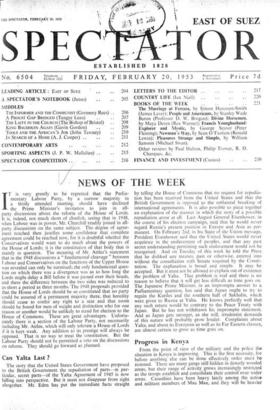NEWS OF THE WEEK I T is very greatly to be
regretted that the Parlia- mentary Labour Party, by a narrow majority in a thinly attended meeting, should have • declined the Prime Minister's invitation to join in all- party discussions about the reform of the House of Lords. It is, indeed, not much short of churlish, seeing that in 1948, when Labour was in power, Mr. Churchill readily joined in all- party discussions on the same subject. The degree of agree- ment reached then justifies some confidence that complete agreement could be reached now, for it is doubtful whether the Conservatives would want to do much about the powers of the House of Lords; it is the constitution of that body that is mainly in question. The meaning of Mr. Attlee's statement that in the 1948 discussions a " fundamental cleavage" between Tabour and Conservatives on the functions of the Upper House was revealed can only be surmisediahe only fundamental ques- tion on which there was a divergence was as to how long the Lords might delay a Bill before it was passed over their heads, and there the difference between the two sides was reduced to as short a period as three months: The 1948 proposals provided that the House of Lords should be so constituted that no party could be assured of a permanent majority there, that heredity should cease to confer any right to a seat and that room should be found for men of weight and distinction who for one reason or another would be unlikely to stand for election to the House of Commons. These- are great advantages. Unfortu- nately there is a section of the Labour Party, not necessarily including Mr. Attlee, which will only tolerate a House of Lords if it is kept weak. Any addition to its prestige will always be opposed. That is no way to treat the constitution. But the Labour Party should not be permitted a veto on the discussions on reform. They should go forward as planned.


































